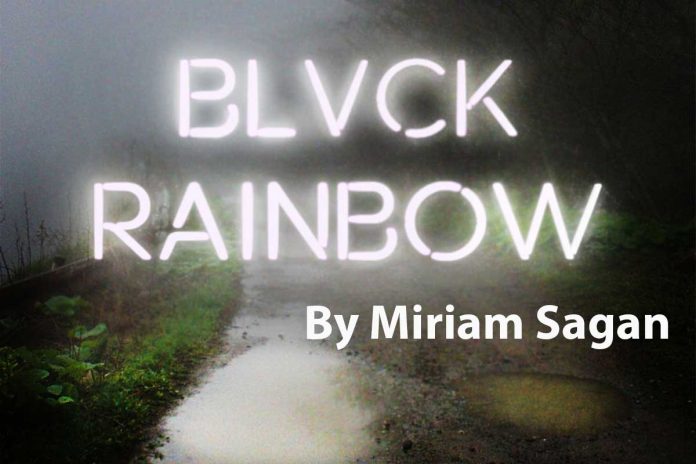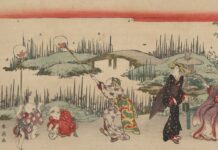(An Excerpt from the novel)
….Fifteen year old Rania has gone in search of the woman who killed her pregnant mother. She is taken in and cared for for one night by the kindly Armenian couple who give her both food and philosophy, and connect her to the past. This renews her strength as she goes forward………..
It was late afternoon, almost evening. For the first time in months, there was not a hint of moisture in the sky. I thought about coffee, but this was one of those solid residential neighborhoods without so much as a hot dog cart.
I sat down on a cold metal bench and pulled the envelope out of my pocket. Inside was a square piece of paper. On the paper was drawn a map. It started with my park bench, then led by arrows to La Guardia airport. After that, there was a path from Albuquerque, New Mexico to Pilar. Pigeons fluttered by. It was going to be dark soon. It was still winter here, but it must be warmer in New Mexico. I just wasn’t going to go back to New Jersey without Monique.
My mother was dead. I was going to find the woman who had killed her. A yellow taxi turned the corner, and I hailed it.
“Where to, little lady?”
“La Guardia.” I settled back into the seat.
“Say, where are you going?”
“New Mexico,” I said. “I’m going to New Mexico to see my mother.”
At the ticket counter, I found a flight leaving for Albuquerque the next morning. I paid for it by fishing money out of my boot, somewhat embarrassed by how it looked and smelled. But it was still real money, and the agent handed me a ticket in exchange.
I slept that night wrapped in my coat, first in a chair, then in a corner. No one disturbed me. By breakfast, the concessions had opened and I ate a sweet roll and a cup of coffee. I boarded the plane, and it lifted off into a pale sky cluttered with doves, with sputniks, with constellations in the shapes of animals and their hunters. The Manhattan skyline melted away. Over flat plains that might have been Kansas I saw a double rainbow, an arc rising out of a rainstorm that never hit earth, water droplets falling from twenty thousand feet to ten thousand feet, but steaming off before they hit the earth below.
The double rainbow formed a gateway I could enter, because unlike ordinary people, I had more than one mother. I was a person with two bodies, like a pair of Siamese twins, joined to something I hadn’t chosen. The double rainbow had two arcs–one the colors that Noah saw and one black as my throat when I swallowed the love bead.
We passed through the rain. Now mountains appeared in the earth, stark and lumpy, rising up as if towards me personally. The airplane landed in a headwind. It gave a bounce, then did a wheelie on the runway before it leveled to a stop. Mountains rose on all sides. There were gods and spirits here I didn’t understand, too many gods for comfort.
Off the plane, I scanned the gate, but of course no one was waiting for me.
I was a stranger. The walls of the airport were covered in tiled mosaics of masked gods, men who were animals, animals who danced. I had only my carry-on luggage. I went to the first phone booth I saw and opened the telephone directory. As I paged through it, I scanned for names that sounded Armenian. Someone must have once told me to do this–Grace, or my grandmother–to look for Armenians if I was ever lost. I hit luck in the D’s with Deukjamian and the N’s with Najarian. But the Deukjamians had two initials and the Najarian had only one. What if it was a Mr. Najarian, a creepy old man in an apartment that smelled of drains. I took a thin dime out of my pocket and dialed the Deukjamian’s number.
“Hello. Deukjamian’s Fine Rigs. May I help you?” It was a pleasant motherly voice.
“Mrs. Deukjamian?”
“Yes?”
“You don’t know me…” I gave her my full name with its convincing Armenian syllables. “I’m all alone in the Albuquerque airport. My grandmother was supposed to meet me. She lives up north, near Taos, but she’s sick and when I called she told me to take the bus but there isn’t one until morning and I…I’m just so tired…I was looking for a motel when I saw your name and it
sounded like home, so I’m sorry I called and intruded…”
“Now dear,” the voice warmed up, “I don’t like the idea of you being in a strange place all alone. How old are you?”
“Fourteen,” I lied, subtracting.
“Just a moment.” She put her hand over the receiver, but I could hear her murmuring. Her soft cultivated voice reassured me. “Dear,” said Mrs. Deukjamian, “we think you should come and stay with us and have some dinner.” She gave me the address of the rug store. “It isn’t far. We’re just in Old Town.”
I hailed a cab in the desert air. Not far from the airport we turned off the strip
and into an older section of town. There were pawn stores and places selling turquoise and cowboy hats. Around a plaza were narrow streets, adobe houses, high walls, enclosed gardens, and the rug store. Deukjamian’s proudly displayed rugs in a courtyard. Rugs were hung over gates, spread against walls, even hanging from the branches of a thick tree.
The rugs were enormous. They were woven in zigzags, in stars, in dense lines, in doves on branches, in the tropical colors of Mexico and in the pale bold hues of Central Asia, and in the clear psychedelics of the Navajo.
Mrs. D came towards me, holding out her hands. She had a kind look on her face, a colorful sweater, and a strand of pearls.
“Come in, dear. I won’t be a moment. Help me bring these rugs in, won’t you. Thank you. I’m closing a bit early today. My goodness, your hands are freezing. And you look awfully young to be traveling alone. Well, another day done. Some good sales, too, even though this is the slow season. This way, yes, yes, the apartment is behind the store. You know, you look a little like the way my second daughter did at your age, though she is long grown. This way.”
We went out to the back of the store and through a small courtyard. Mrs. D. unlocked a wrought iron gate, and led me into an adobe house. A climbing
vine looked ready to bud. Birds made an evening noise in a fruit tree against the wall.
Mr. Deukjamian greeted us, a portly man with a mustache, who smelled of after shave and cigarettes. He kissed my hand, and offered me a glass of dark, faintly bitter, wine.
“Our young countrywoman,” he beamed. “The world traveler. And where do you hail from?”
“New Jersey,” I said. “Bergen County. But I was born right here in Albuquerque.”
“And you still have a grandmother in…”
“Pilar,” I said firmly.
Mrs. D. fluttered about, preparing dinner. “See, I knew it was the right thing,” she told him. “Look how young she is! Suppose something had happened to her. Doesn’t she remind you of Denise? I’m sure I would have wanted someone to help my girls had they ever been traveling all alone.”
“Young women are different today, “ said Mr. D. “More independent.”
“But the world has changed. It’s a rougher place. The world isn’t what it used to be.”
“No, the world is exactly the same,” said Mr. D. “You just refused to face facts when the girls were young. “Now history will show us…”
“History! Always history! May I remind you that you are a rug dealer, not a professor?” snapped Mrs. D. She was setting out linen napkins on a blue tablecloth. “You’d think that with all the blessings that life has brought you’d…”
“You are my greatest blessing,” Mr. D. twinkled at her. “Particularly when you argue.”
“I’m serious. You take a pessimistic view at all times, you insist on it, why can’t you…”
“There’s no life that can’t be ruined in a day and a night,” said Mr. D. solemnly, although his eyes still smiled.
“Is that a proverb?” I asked.
“No,” said Mrs. D. “And now dinner is served. Please come to the table before things get cold.”
DInner was meat cooked on skewers with green peppers, tomatoes and onions. There was yellow rice and green salad. An unfamiliar touch
was a bowl of salsa, a kind of Mexican relish that burned my tongue. For desert there were cut glass bowls of vanilla ice cream served with hard sugar cookies. After dinner, Mrs. D. cleaned up and puttered around. I offered to help, but she just told me to rest. Mr. D. was reading a huge volume–a history of something or other–with his feet on a hassock. After a page or two
he caught me watching him.
“He who does not understand the past is condemned to repeat it,” he intoned.
“That’s a proverb,” I said.
“Sure.” He patted his mustache. “But it is also true. As an Armenian you should know that.”
“I know all about the Turks,” I said.
“But it’s more than that,” Mr. D continued. “Each person should know his or her own history. For example, you were born right here in New Mexico.”
“Yes.”
“So in a way you’ve come to find your origins.”
I nodded, stricken.
“Why the worried look?” asked Mr. D.
“Something terrible happened to me here…when I was born…up in the mountains…” I choked out the words.
Mr. D just looked at me thoughtfully. He didn’t jump all over with questions, or offer answers. I was grateful for his quiet, his kindness. After a while he just said: “And so you’ve come all this way to find out what happened?”
“Yes, I have.”
“Then I think you are doing the right thing. He who does not understand the past…she who does not…what I’m trying to say is–nothing is so terrible once you understand what made it happen.”
I nodded mutely. I knew he was right–or at least I hoped so.
Mrs. D had been listening to us for a few minutes, drying her hands on a dish towel. “You must be tired, Rania, there is nothing like a good night’s sleep when you’re traveling. Let me show you your room.
The guest room had once belonged to the third daughter, but now all three girls were grown up and married. Mrs. D. proudly told me she already had four grandchildren. The room was thick with carpets, like the rest of the house.
I took a long shower before getting into bed. I sampled all of Mrs. D.’s toiletries–the herbal shampoo, the lavender soap, the fancy dusting powder. I smelled good, too good to be worried or homesick. I slept soundly through the night until Mr. D. woke me in time for the morning bus to Taos.
“Tell me about your grandmother,” Mr. D quizzed me as he pulled in and out of traffic on the way to the bus station.
“I usually only see her on Christmas and Easter or something. She comes to New Jersey.”
“Then you’ve never been to Pilar?”
“Oh no, I mean yes.”
“What’s her house like?”
“Nice. Pretty big. I mean not too big. It’s nice. And it has a nice garden.”
“Is she ill or something, that you’re going to visit?”
“Ill? No. Oh yes, she’s sick of course. Arthritis I think…”
“Rania, take good care of yourself,” he said at the bus station. “Keep an eye on her,” he instructed the driver, “and see that she gets off safely at Pilar.”
My last sight of him was of a mournful figure with a mustache, solemnly waving good-bye to me under a turquoise sky.
About the author:
Miriam Sagan is the author of 30 published books, including the novel Black Rainbow (Sherman Asher, 2015) and Geographic: A Memoir of Time and Space (Casa de Snapdragon). which won the 2016 Arizona/New Mexico Book Award in Poetry. She founded and headed the creative writing program at Santa Fe Community College until her retirement in this year (2017) . Her blog Miriam’s Well (http://miriamswell.wordpress.com) has a thousand daily readers. She has been a writer in residence in two national parks, at Yaddo, MacDowell, Colorado Art Ranch, Andrew’s Experimental Forest, Center for Land Use Interpretation, Iceland’s Gullkistan Residency for creative people, and another dozen or so remote and unique places. Her awards include the Santa Fe Mayor’s award for Excellence in the Arts, the Poetry Gratitude Award from New Mexico Literary Arts, and A Lannan Foundation residency in Marfa.
















